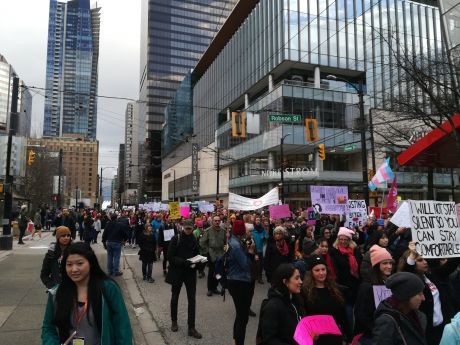News
You are here
Resist, Persist!: Third Annual Women’s March On Vancouver

January 21, 2019
Over the weekend March On Vancouver hosted its third annual Women’s March. The event took place on January 19 with roughly one thousand people in attendance. The march began at the Vancouver Art Gallery and headed a few blocks down towards the courts on Smithe street before looping back. The procession was lead by Vancouver-based indigenous drumming group, Daughters of The Drum, and the singing of the Warrior Woman’s Song. The full roster of speakers highlighted a need to address intersectionality within feminist movements
All too often women who’s identities intersect with different marginalized groups are left behind in feminist movements. Speakers at the march addressed this intersectionality and spoke on behalf of the complexity of issues women face. Behind each speaker were volunteers holding signs and as each speaker approached the microphone the signs would be exchanged for slogans that spoke to the issues being presented. Community organizer Mitra Kazemi spoke about the unique issues facing women of colour. She recounted the discrimination other women and herself faced growing up in Canada. Jewelles Smith, feminist and human rights activists, spoke to the treatment of women living with disabilities and how they are left behind in feminist movements. As well, Olive Bing, experiential sex worker, emphasized a need to de-stigmatized sex work in order for society to move forward. Having recently moved from the states, Rabbi Laura Duhan-Kaplan, commented on the rise of antisemitism as a cautionary tale for Canada. Laura described her own experience and the realization that antisemitism and Islamophobia are on rise in Canada citing recent attacks on Mosques and Synagogues.
Jerilynn Webster, aka JB The First lady, spoke as well before breaking out into a track off her new album. She addressed the growing concern over the Wet’Suwet’en nation and the need for solidarity as they fight their battle against Coastal Gaslink. Jerilynn Webster not only fears the displacement of her people but also the reality of the “man-camps” these projects create. Where pipelines are built, workers camps follow and in these camps there is a higher rate of sexual abuse that targets Indigenous women in neighbouring communities.
Although the event highlighted many of the problems society currently faces, there was an atmosphere of hope. The fact that many of these issues intersect can be daunting but it also increases the number of allies in attendance with a common vision for a better society. Knowledge on where issues intersect also gives us a better understanding of where these problems come from and how economic systems, like capitalism, exacerbate them.
Section:










